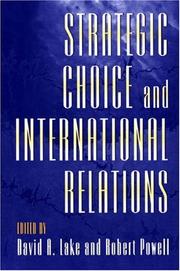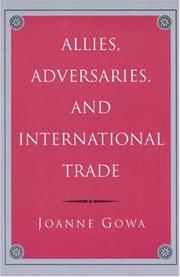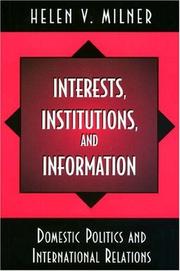| Listing 1 - 3 of 3 |
Sort by
|

ISBN: 0691213097 0691026971 069102698X Year: 1999 Publisher: Princeton University Press
Abstract | Keywords | Export | Availability | Bookmark
 Loading...
Loading...Choose an application
- Reference Manager
- EndNote
- RefWorks (Direct export to RefWorks)
The strategic-choice approach has a long pedigree in international relations. In an area often rent by competing methodologies, editors David A. Lake and Robert Powell take the best of accepted and contested knowledge among many theories. With the contributors to this volume, they offer a unifying perspective, which begins with a simple insight: students of international relations want to explain the choices actors make--whether these actors be states, parties, ethnic groups, companies, leaders, or individuals. This synthesis offers three new benefits: first, the strategic interaction of actors is the unit of analysis, rather than particular states or policies; second, these interactions are now usefully organized into analytic schemes, on which conceptual experiments may be based; and third, a set of methodological "bets" is then made about the most productive ways to analyze the interactions. Together, these elements allow the pragmatic application of theories that may apply to a myriad of particular cases, such as individuals protesting environmental degradation, governments seeking to control nuclear weapons, or the United Nations attempting to mobilize member states for international peacekeeping. Besides the editors, the six contributors to this book, all distinguished scholars of international relations, are Jeffry A. Frieden, James D. Morrow, Ronald Rogowski, Peter Gourevitch, Miles Kahler, and Arthur A. Stein. Their work is an invaluable introduction for scholars and students of international relations, economists, and government decision-makers.
Strategic planning. --- International relations. --- Axelrod, Robert. --- Bueno de Mesquita, Bruce. --- Chicken Game. --- Depew, David J. --- Fearon, James. --- Frieden, Jeffry. --- Hirshleifer, Jack. --- Keohane, Robert O. --- Lake, David. --- Lamarckism. --- Morrow, James. --- Rogowski, Ronald. --- aggregation of preferences. --- constructivist theories. --- deterrents: alliances as. --- ecology, organizational. --- hegemonic stability theory. --- linkage in bargaining. --- mathematical model. --- multiple-veto systems. --- reversion point. --- scale of units. --- screening.

ISBN: 0691044716 0691033552 0691221340 Year: 1995 Publisher: Princeton, N.J. Princeton University Press
Abstract | Keywords | Export | Availability | Bookmark
 Loading...
Loading...Choose an application
- Reference Manager
- EndNote
- RefWorks (Direct export to RefWorks)
During the Cold War, international trade closely paralleled the division of the world into two rival political-military blocs. NATO and GATT were two sides of one coin; the Warsaw Treaty Organization and the Council for Mutual Economic Assistance were two sides of another. In this book Joanne Gowa examines the logic behind this linkage between alliances and trade and asks whether it applies not only after but also before World War II.
World politics --- International trade. --- Free trade. --- East-West trade. --- Alliances. --- Alliances --- Treaties of alliance --- International relations --- Treaties --- East-West trade (1945- ) --- International trade --- Free trade and protection --- Trade, Free --- Trade liberalization --- External trade --- Foreign commerce --- Foreign trade --- Global commerce --- Global trade --- Trade, International --- World trade --- Commerce --- International economic relations --- Non-traded goods --- Law and legislation --- Asquith, Henry H. --- Austria-Hungary. --- Britain. --- Cambon, Paul. --- Cold War. --- Deardorff, Alan V. --- Eichengreen, Barry. --- Entente, Anglo-French. --- France. --- Fudenberg, D. --- Gasiorowski, Mark. --- Germany. --- Grey, Sir Edward. --- Haggard, Stephan. --- Iceland. --- Italy. --- Japan. --- Keohane, Robert O. --- Kindleberger, Charles P. --- Lavergne, Real P. --- Linnemann, Hans. --- McKeown, Timothy. --- Milward, Alan S. --- Nye, John Vincent. --- Pollins, Brian. --- Snidal, Duncan. --- United Nations. --- Vietnam War. --- balance of power. --- bipolarity. --- chain-store paradox. --- deterrence. --- hegemonic stability theory. --- market failure. --- optimal tariff. --- rational hegemons. --- security externalities. --- terms of trade. --- Foreign trade policy --- Freihandel. --- Aussenhandel.

ISBN: 069101177X 0691011761 0691214492 9780691011769 9780691011776 Year: 1997 Publisher: Princeton, N.J.: Princeton university press,
Abstract | Keywords | Export | Availability | Bookmark
 Loading...
Loading...Choose an application
- Reference Manager
- EndNote
- RefWorks (Direct export to RefWorks)
Increasingly scholars of international relations are rallying around the idea that “domestic politics matters.” Few, however, have articulated precisely how or why it matters. In this significant book, Helen Milner lays out the first fully developed theory of domestic politics, showing exactly how domestic politics affects international outcomes. In developing this rational-choice theory, Milner argues that any explanation that treats states as unitary actors is ultimately misleading. She describes all states as polyarchic, where decision-making power is shared between two or more actors (such as a legislature and an executive). Milner constructs a new model based on two-level game theory, reflecting the political activity at both the domestic and international levels. She illustrates this model by taking up the critical question of cooperation among nations.Milner examines the central factors that influence the strategic game of domestic politics. She shows that it is the outcome of this internal game — not fears of other countries’ relative gains or the likelihood of cheating — that ultimately shapes how the international game is played out and therefore the extent of cooperative endeavors. The interaction of the domestic actors’ preferences, given their political institutions and levels of information, defines when international cooperation is possible and what its terms will be. Several test cases examine how this argument explains the phases of a cooperative attempt: the initiation, the negotiations at the international level, and the eventual domestic ratification. The book reaches the surprising conclusion that theorists — neo-Institutionalists and Realists alike — have overestimated the likelihood of cooperation among states.
International relations. Foreign policy --- #SBIB:327.1H10 --- #SBIB:327.7H01 --- #SBIB:AANKOOP --- Internationale betrekkingen: theorieën --- Grondslagen, principes, evolutie internationale gemeenschap --- #A0206PO --- Information policy. --- International relations. --- Nation-state. --- World politics --- Information policy --- International relations --- Nation-state --- Information science --- Information services and state --- Communication policy --- National state --- State, The --- National interest --- Self-determination, National --- Coexistence --- Foreign affairs --- Foreign policy --- Foreign relations --- Global governance --- Interdependence of nations --- International affairs --- Peaceful coexistence --- World order --- National security --- Sovereignty --- Government policy --- INTERNATIONAL RELATIONS. --- CASE STUDIES. --- STATES. --- POLITICAL COOPERATION. --- International co-operation. --- Information. --- States. --- International politics. --- Foreign policy. --- Politics. --- Política interna. --- Política internacional. --- Relações internacionais. --- Rationele keuze. --- Politieke instellingen. --- Binnenlandse politiek. --- Internationale samenwerking. --- Theorie --- Nationalstaat --- Internationale Politik --- Interessenpolitik --- World politics. --- Accords internationaux. --- CED = Communaute europeenne de defense. --- Politique de l'information. --- Politique internationale. --- Relations internationales. --- UE/CE CECA. --- UE/CE Traite de Maastricht. --- Unions economiques et monetaires. --- 89.70 international relations: general. --- 89.71 international cooperation: general. --- Information --- Politique mondiale --- Nation. --- Politique gouvernementale. --- Colonialism --- Global politics --- International politics --- Political history --- Political science --- World history --- Eastern question --- Geopolitics --- International organization --- Belgium. --- Bundesbank. --- Chicago Convention. --- Democrats (US). --- Evans, Peter. --- Frieden, Jeffry. --- German rearmament. --- Jacobson, Harold. --- Keohane, Robert. --- Keynes Plan. --- Laver, Michael. --- Lijphart, Arendt. --- Milner, Helen. --- Obstfeld, Maurice. --- Phillips curve. --- Putnam, Robert. --- Rogowski, Ronald. --- Schelling conjecture. --- Truman Administration. --- absolute gains. --- amendment power. --- balance of payments. --- capital mobility. --- cartel. --- domestic politics. --- hierarchy. --- independents. --- interest groups. --- legislature. --- parliamentary systems. --- ratification. --- side payments. --- two-level games. --- World politics - 1989 --- -Information policy --- VIE INTERNATIONALE --- POLITIQUES PUBLIQUES --- REGLES INTERNATIONALES --- POLITIQUE ECONOMIQUE EXTERIEURE --- ORGANISATIONS INTERGOUVERNEMENTALES --- REGIMES INTERNATIONAUX --- Interessenvermittlung --- Lobbyismus --- Interessenverband --- Internationale Beziehungen --- Politische Beziehungen --- Zwischenstaatliche Beziehungen --- Weltpolitik --- Außenpolitik --- Internationales politisches System --- Nationalstaaten --- Staat --- Nationale Einheit --- Praxis
| Listing 1 - 3 of 3 |
Sort by
|

 Search
Search Feedback
Feedback About UniCat
About UniCat  Help
Help News
News